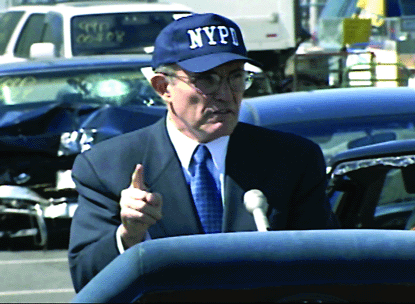Muckraking exposé retraces Giuliani’s record of wrongs
Perhaps the most urgent documentary to surface this year since “Why We Fight,” the Gotham reality opera “Giuliani Time” critically interrogates the rock-ribbed former mayor’s legacy, unclogging voters’ memory holes just as Run, Rudy boosters crank up their spin machine.
Produced over seven years by Kevin Keating, frequent cameraman for Barbara Kopple and the Maysles, “Giuliani Time” is a powerful “dissensus” statement that focuses on the presidential hopeful’s serial violations of First Amendment freedoms of expression and assembly, cutbacks in services for the hungry and homeless, and imposition of draconian “zero tolerance” policing that all but precluded racial comity.
Longtime political correspondent Wayne Barrett, who met Rudy Giuliani on his appointment by President Ronald Reagan as associate U.S. attorney to New York’s Southern District, serves as Keating’s primary guide. Indeed, one of the film’s ancillary virtues is to return us to Barrett’s densely detailed “Rudy! An Investigative Biography,” published in 2000. Barrett knowledgeably evokes Giuliani’s childhood until age six in the blue-collar Flatbush enclave once known as Pigtown, so called for its immigrant families’ livestock pens.
Explaining in his book that interviews with family members and other sources yielded more extensive data concerning family ties with organized crime than could be publicly disclosed, Barrett here climbs the slope of Sing Sing to narrate how Giuliani’s father Harold served time before gravitating to Vincent’s Bar back in Brooklyn, where the basement was jumpin.’
Young Rudy’s path is retraced from Catholic school in suburban Long Island through NYU Law School in the late 1960s; although initially sympathetic to the anti-war movement, Giuliani swung sharply right with the times and found reward for his fervor. As a hotshot prosecutor in the federal justice bureaucracy, he earned conservative cred through merciless interdiction of Haitian boat people fleeing “Baby Doc” Duvalier’s terror, rejecting human rights claims as refugee corpses washed ashore in Florida.
On the other hand, Giuliani’s salutary prosecution of white-collar crime is duly noted.
The film observes that, once elected, Giuliani managed to sweep credit for the decline in crime that had in fact begun during David Dinkins’ administration, and was not unique to the city but consistent with a nationwide ebb. It doesn’t quite address how this sleight-of-hand was effected, other than a cursory nod to distortions of the white-owned corporate media. The mainstream media played their part, but somewhat further consideration of the protracted conservative backlash would help contextualize Giuliani’s authoritarian-populist appeal and the givens he inherited.
When Giuliani was elected in 1993 by a 51-to-48 margin, defeating the first black mayor in New York City history to become the first Republican mayor in 28 years, he reaped the spoils of a backlash begun in earnest two decades earlier with the 1975 bankruptcy crisis managed by the city’s landed financial elites. Acting through publicly unanswerable entities like the Emergency Financial Control Board, they froze the city’s access to private credit and capital, conditioning bailout on the reversal of modest working-class social gains and safeguards for the poor that were abhorrent to free-market fundamentalists.
The fiscal meltdown was seized as the opportunity to shed black and Latino municipal employees from city payrolls en masse, implement irreparable cutbacks in wages and pensions, and slash public services in racially targeted neighborhoods of the Bronx, Brooklyn, the Harlems, and the Lower East Side to the degree where they became virtually uninhabitable. The field was thereby primed for development of luxury condo units, office suites, and upscale retailers, setting a precedent reinforced and extended through subsequent mayoralties. Giuliani’s mandate to privatize public services and further gut welfare protections evolved from such a matrix, with the conservative Manhattan Institute supplying the policy ordnance.
“Giuliani Time” debuted at last year’s Rotterdam Film Festival fall but was delayed opening here due to steep clearances for its copious news clips and other archival elements. Altogether, the filmmakers balance a formidable array of materials, with an especially fine sound mix that smoothes over the odd patch of mottled camcorder footage. As shrewd progressive propaganda, “Giuliani Time” is broadly convincing, even if it resorts at moments to stridency when the evidence, cogently presented, requires little embellishment.
While Keating’s many interlocutors are a generally astute bunch, a tiny handful are less than lovely. However obliging former mayor Edward I. Koch may have been, he will be remembered as riding to office in 1977 on a wave of racialized panic following that summer’s blackout and lootings, and for consolidating the transfer of power to the securities and real estate sectors begun in the fiscal crisis—to say nothing of his idling while New Yorkers perished by the thousands in the first years of the AIDS epidemic.
“Giuliani Time” closes as ominously as it opens, with Rudy’s past excesses absolved in the sulfurous vapors of 9/11, standing as firm and fast as those holy towers, gone to GOP glory with a fulgent political horizon before him. With all this to chew on, Keating passed over Giuliani’s valedictory affront—the lockdown of his administration’s papers, through clandestine arrangement with the municipal records department one week prior to leaving office, in a private storage facility where they could be redacted or deep-sixed at his discretion.
Is the past even past? Three decades of backlash politics and free-market rapine have transformed the demotic metropolis that once held opportunity for people of all classes into a gilded Super-Max. Every New Yorker ought to see “Giuliani Time” to better grasp his role in our history, and the shadow he throws across our future.
gaycitynews.com


































